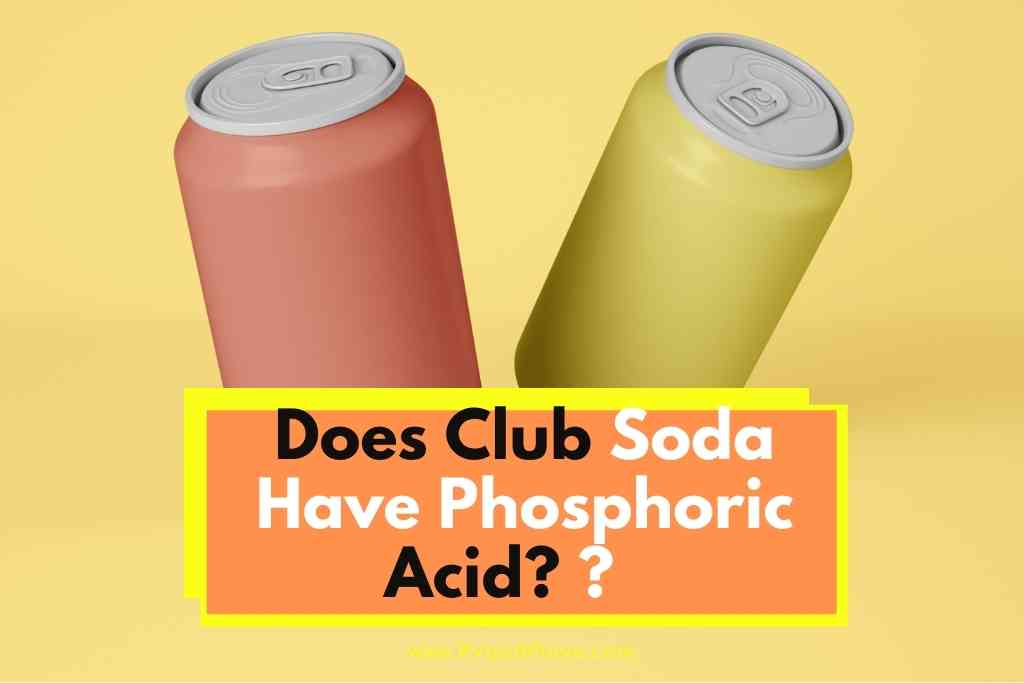Have you ever asked yourself if Club Soda has Phosphoric Acid? well, you are in the right place.
As awareness grows regarding the health benefits or risks of certain beverages, more and more people want to know what exactly is in their favorite drink. Phosphoric acid in beverages has raised eyebrows recently as studies have linked it to low bone mineral density and other undesirable health risks.
So, does Club Soda have Phosphoric Acid? For those who enjoy club soda, you will be glad to know there is no phosphoric acid in club soda. It is safe to use club soda as an alternative to sugary sodas or high-calorie drinks.
Discover more about club soda and other seltzers, and why it is best to avoid beverages with phosphoric acid in them.
Table of Contents
What is club soda? Is it the same as seltzer or tonic water?
The varieties of water beverages can be confusing. Mineral water, sparkling water, club soda, and tonic water are all similar, but there are some key differences between them.
Seltzer Water
Aka soda water, seltzer water is just plain water carbonated with carbon dioxide. Due to its neutral taste, it is often flavored with fruity essences. La Croix is a popular brand of seltzer water.
Club Soda
Club soda is similar to seltzer water, however, in addition to carbon dioxide, minerals are also added, such as potassium or sodium bicarbonate, sodium citrate, potassium sulfate, and sodium chloride.
Read Also: Does Club Soda Have Sugar? (Carbs In Club Soda – The Truth!)
These alkaline minerals neutralize any acidity and mimic the flavor of naturally occurring carbonated mineral water. Canada Dry is a popular brand of club soda.
Sparkling Water, or Sparkling Mineral Water
Sparkling mineral water has minerals such as potassium, sodium, and magnesium. However, unlike club soda, these minerals occur naturally in the water as it filters upwards from the ground.
Mineral waters will taste differently depending on their source. The bubbles in the water may be natural or artificially added. Perrier is a popular brand of sparkling mineral water.
Tonic Water
Tonic water is seltzer water that has quinine and sugar added to it. Quinine was used in the past as a preventative “tonic” against malaria. Due to quinine’s bitter taste, soda and sugar were added to it, resulting in tonic water.
Tonic water is the only beverage on this list that has calories because of the sugar added to it. Seagram’s is a popular brand of tonic water.
Does club soda contain any acids?
The carbonation process of any beverage will produce carbonic acid as a by-product. Carbonic acid is a weak acid that stimulates the same nerve endings in the mouth and tongue as mustard.
That is why carbonated beverages have that tingling sensation that is both pleasant and slightly irritating. Carbonic acid does not change the acidity of the human body.
In club soda, any acidic taste created by carbonic acid is neutralized by the alkaline minerals that are added to it.
Are carbonated drinks bad for you?
The carbonation process has gotten a bad rap because it is so often associated with carbonated soft drinks. However, it is important to note the difference between carbonated soft drinks and other carbonated drinks such as club soda and seltzer water.
Carbonated soft drinks, colas, and pop
Soft drinks have loads of added sugar and other additives. They are notorious for containing “empty calories”, which means that you do not feel as full after drinking a soft drink as you would after eating food with the same amount of calories.
This inevitably leads to overconsumption and weight gain. They also contain artificial additives and acids that can lower bone density and eat away tooth enamel.
Carbonated waters
Carbonated waters such as club soda are actually shown to have health benefits, such as improving swallowing ability and reducing indigestion and constipation. They also may have added healthy minerals such as potassium.
Carbonated water may create a feeling of fullness, which can help curb the appetite. Most varieties will have zero calories and zero sugar, making them an ideal choice for people watching their waistline.
Not all carbonated waters are created equal. It is important to look closely at specific product labels, as some may have added sweeteners, which will add calories.
Tonic water in particular will have sugar and calories, and for some, the quinine can cause unpleasant side effects such as upset stomach, headache, or ringing ears. Some people also note a feeling of bloating or gas from drinking too much-carbonated water.
As with most food and beverages, moderation is key to drinking any carbonated drink.
Read Also: Does Club Soda Have an Expiration Date? (The Truth!)
What is phosphoric acid and why should I avoid it?
Food-grade phosphoric acid is a syrupy, clear, odorless substance that can occur naturally in some products but is used as a food additive in beverages. Phosphoric acid is also widely used in many agricultural, industrial, and household products. For example, it is used in fertilizers, cleaners, and rust inhibitors.
In the beverage industry, it is used for two reasons: to give beverages a tangy flavor, and to prevent the growth of mold and bacteria.
Dark-colored soft drinks (such as colas) are actually as acidic as lemon juice without added sugar, so soft drink manufacturers have to add large amounts of sugar to offset the acidity.
However, those large amounts of sugar then become a haven for bacteria and mold growth. Thus, the addition of phosphoric acid becomes necessary, both for taste and for mold prevention.
Why is phosphoric acid bad for you?
Although the FDA has rated food-grade phosphoric acid as safe for general consumption, one study has shown that phosphoric acid (not carbonation) in cola lowers bone mineral density.
Another study found that phosphoric acid in all soft drinks increased the risk of hypocalcemia (low calcium levels) in post-menopausal women. As an acid, it has also been shown to wear tooth enamel and contribute to tooth decay.
One way to avoid phosphoric acid is to drink a clear-colored soft drink (such as a lemon-lime flavored drink), as these usually use citric acid instead of phosphoric acid.
However, it is probably best to avoid all sugary, high-calorie soft drinks due to their cumulative unhealthy effects on the body. If you really enjoy the bubbly sensation of carbonation, alternatives like flavored sparkling water and club soda are ideal.
Here are some of my favorite services, products, and Stores
There are affiliate links, so if you do decide to use any of them, I´ll earn a small commission. But in all honesty, these are the exact what I use and recommend to everyone, even my own family.
To see all my of most up-to-date recommendations, check out this resource that I made for you!
+ Products & Services
+ Convenience Stores
+ Save Thousands of Dollars
References
https://www.webmd.com/diet/sparkling-water-health-benefits
Recent Posts
Do you know if Club Soda has alcohol? this is one of the questions our readers ask a lot. Well, we´ve got you covered. Club soda has been a staple at bars for a long time. This classic carbonated...
Do you know if Club Soda can hydrate you? this is one of the questions our readers ask a lot. Well, we´ve got you covered. Staying hydrated is one of the most important things we can do for our...


